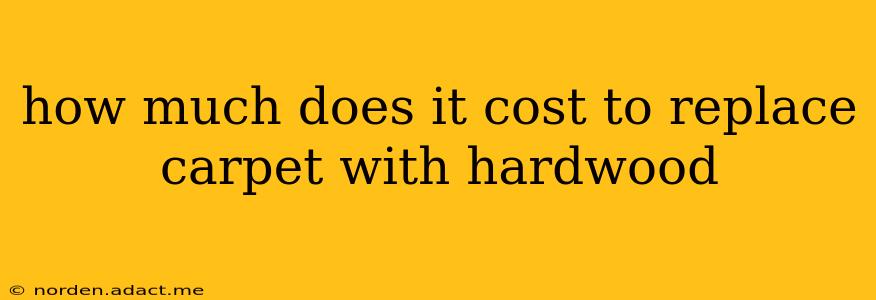Replacing carpet with hardwood flooring is a significant home improvement project that can dramatically enhance your home's aesthetic appeal and value. However, the cost can vary widely depending on several factors. This comprehensive guide breaks down the expenses involved, helping you budget effectively for your hardwood floor installation.
What Factors Influence the Cost of Hardwood Floor Installation?
Several key factors determine the total cost of replacing your carpet with hardwood:
-
Type of Hardwood: Hardwood flooring comes in various species, each with a different price point. Popular choices like oak and maple are generally more affordable than exotic woods like Brazilian cherry or hickory. The cost difference can be substantial, impacting the overall project budget considerably.
-
Wood Grade: Hardwood is graded based on its appearance, with higher grades featuring fewer knots and imperfections. Higher-grade wood typically costs more. Understanding the grading system is crucial for balancing cost and aesthetic preferences.
-
Installation Method: Hardwood can be installed in several ways, including nail-down, glue-down, or floating floor installation. The method chosen will influence labor costs and potentially material costs as well. Nail-down installation, for example, often requires more skilled labor.
-
Wood Flooring Thickness: Thicker hardwood planks generally last longer and can be sanded and refinished multiple times, increasing their lifespan and value. However, thicker planks also cost more.
-
Square Footage: The size of the area to be covered is a primary driver of cost. Larger areas naturally require more materials and labor, leading to a higher overall price.
-
Subfloor Condition: If your subfloor requires repair or leveling before hardwood installation, this will add to the total cost. Uneven subfloors can lead to issues with the new hardwood flooring over time.
-
Labor Costs: Labor costs are a significant portion of the total expense. Factors influencing labor costs include the installer's experience, location, and the complexity of the installation.
-
Additional Materials and Costs: This includes costs associated with underlayment, trim, transition strips, and any necessary removal and disposal of the old carpet.
How Much Does Hardwood Flooring Cost Per Square Foot?
The cost of hardwood flooring itself ranges from approximately $3 to $20+ per square foot, depending on the factors mentioned above. Budget-friendly options can fall within the lower range, while high-end materials easily exceed $20 per square foot. Keep in mind that this is just the cost of the material itself.
What is the Average Cost to Replace Carpet with Hardwood?
It's difficult to give a precise average cost without knowing specifics of your project. However, a reasonable estimate for a mid-range hardwood installation, including materials and labor, typically ranges from $6 to $15 per square foot. This encompasses many common scenarios, but costs could easily be higher or lower depending on the factors already detailed.
How much does it cost to remove carpet before installing hardwood?
Carpet removal is usually included in the overall hardwood installation quote. However, if you're getting separate quotes for removal and installation, expect to pay between $1 and $3 per square foot for professional carpet removal and disposal.
What about the cost of hardwood flooring installation only?
Labor costs for hardwood floor installation alone usually fall between $3 and $8 per square foot. This price depends on the complexity of the job, installer experience, and your geographical location.
Tips for Saving Money on Hardwood Floor Installation
-
Shop around for materials and installers: Obtain multiple quotes from different hardwood suppliers and flooring contractors to compare prices and services.
-
Consider less expensive hardwood species: Opting for more affordable hardwood species can significantly reduce costs without compromising the overall look and feel.
-
Do some prep work yourself (if capable): Removing the old carpet and padding yourself can save money. However, ensure you have the skills and tools to do this safely and effectively.
-
Choose a simpler installation method: Simpler installation methods such as floating floors can sometimes reduce overall labor costs.
-
Time your project: Contractor rates and material prices can fluctuate throughout the year. Plan your project to potentially take advantage of off-season pricing.
By carefully considering these factors and obtaining multiple quotes, you can accurately budget for your hardwood floor installation and transform your home with beautiful, durable flooring. Remember to always choose reputable contractors and suppliers to ensure a high-quality installation and long-lasting results.
